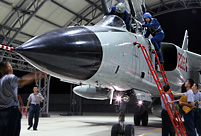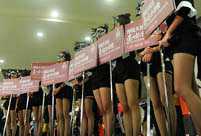TRAGIC TURN
On Saturday two transit workers - a BART manager and a contractor - were struck and killed by a train while inspecting a section of track.
The unions suggested in a statement on Sunday that BART management might have been partly responsible for the deaths, saying labor officials had warned BART executives about the risks of allowing replacement drivers to operate trains.
The driver of the train in question, which was out of service and not carrying commuters at the time, has not been identified. BART officials said the train was running on automatic control when the accident occurred.
The National Transportation Safety Board began an investigation of the incident on Sunday.
TALKS BY PHONE
The settlement came after the two sides resumed bargaining Monday afternoon, conducting their talks by telephone through a federal mediator who acted as a go-between rather than meeting face-to-face, at least initially.
The negotiations were the first since a previous round of talks collapsed last Thursday.
For months, BART and its employee unions have been at odds over pay and benefits. Workers were demanding large pay raises, in part to offset management demands that they contribute to their pensions and pay more for healthcare.
Under the terms of the last contract proposal made public, BART said it was offering a 12 percent pay hike over four years. According to management, BART workers earn $79,000 a year on average, plus benefits. The unions put the average worker's salary at $64,000.
The July BART strike, the first against the transit system since 1997, ended after management and labor agreed to extend their negotiations for 30 days. The unions threatened to strike again in August, but Governor Jerry Brown obtained a court order imposing a 60-day cooling-off period.

 Low wages Indian migrant laborers
Low wages Indian migrant laborers Five fighters in flight training
Five fighters in flight training London mayor hails free trade, subway system on China tour
London mayor hails free trade, subway system on China tour Different eye catching shows at housing fairs in China
Different eye catching shows at housing fairs in China Chalk it up to great courage
Chalk it up to great courage Tibetan girl helps mobilize volunteers onlin
Tibetan girl helps mobilize volunteers onlin Lingerie show dazzles Wuhan Motor Show 2013
Lingerie show dazzles Wuhan Motor Show 2013  Chinese screen goddesses from Beijing Film Academy
Chinese screen goddesses from Beijing Film Academy  Weekly Sports Photos
Weekly Sports Photos Chinese riot police take Liberia peacekeeping mission
Chinese riot police take Liberia peacekeeping mission World has never been dark-- a blind kid’s life in Tibet
World has never been dark-- a blind kid’s life in Tibet Change to law may make it easier to sue polluters
Change to law may make it easier to sue polluters UNESCO world heritage site: Montale Tower
UNESCO world heritage site: Montale Tower U.S. Senate leader announces bipartisan deal
U.S. Senate leader announces bipartisan deal Fiber-optic wedding dress show shinning in Suzhou
Fiber-optic wedding dress show shinning in Suzhou Day|Week|Month